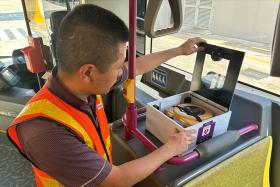More fully electric three-door buses hit the roads here
Commuters can now catch a ride on the first fully electric three-door buses to ply the roads here.
Twenty of these new single-deck buses are being progressively deployed on routes served by services 38 and 40 run by SBS Transit from Bedok Interchange, as well as those served by services 176 and 976 operated by SMRT from Bukit Panjang Interchange, said the Land Transport Authority (LTA).
Some of the 20 buses hit the roads yesterday - the final batch of electric buses to be deployed here out of a fleet of 60 electric buses bought by the LTA in 2018. This is part of the longer-term goal for all of Singapore's 5,800 public buses to be run on cleaner energy by 2040. This includes electric and hybrid buses.
The 20 new buses, supplied by ST Engineering Mobility Services, will be charged using faster overhead pantograph chargers installed at Bedok and Bukit Panjang bus interchanges. An apparatus on the top of the bus connects to overhead electrical lines to charge the bus.
The other 40 electric buses use conventional plug-in chargers at bus depots.
The pantograph chargers have a power rating of up to 450kW, three to five times that of the plug-in chargers.
With the pantograph chargers, bus drivers will be able to charge their buses during the 10- to 15-minute layover time at the interchanges and carry on with the rest of their routes.
This would give drivers enough battery power for up to 48km.
It takes 30 minutes for the new buses to be fully charged, and they have a range of 130km per charge.
In contrast, the buses that use the plug-in chargers take two to four hours to fully charge and have a range of 200km to 300km.
There are two pantograph chargers at each interchange.
Speaking to the media yesterday at the launch of the new electric buses, Transport Minister S. Iswaran said the 40 electric buses that have been progressively deployed since April last year have yielded good results.
They have led to a 50 per cent reduction in emissions, compared with using diesel buses - taking into account the emissions generated by the power grid - and 50 per cent fuel cost savings on a per-km basis.
"That alone is already significant, and then you add to it the benefit in terms of noise reduction," he said.
The electric buses generate about 75 decibels of noise, three decibels lower than typical Euro 6 diesel buses. This means quieter journeys for commuters, LTA said.
Mr Iswaran said the electric buses in use have all performed to manufacturers' specific.
"That is good, because what it means is it can support our decisions for future procurement... and (determine) how much faster we can move on that with confidence about the technology and the overall infrastructure needed to support it."
The minister added it would be wasteful to take existing diesel buses out of service too early.
Get The New Paper on your phone with the free TNP app. Download from the Apple App Store or Google Play Store now




